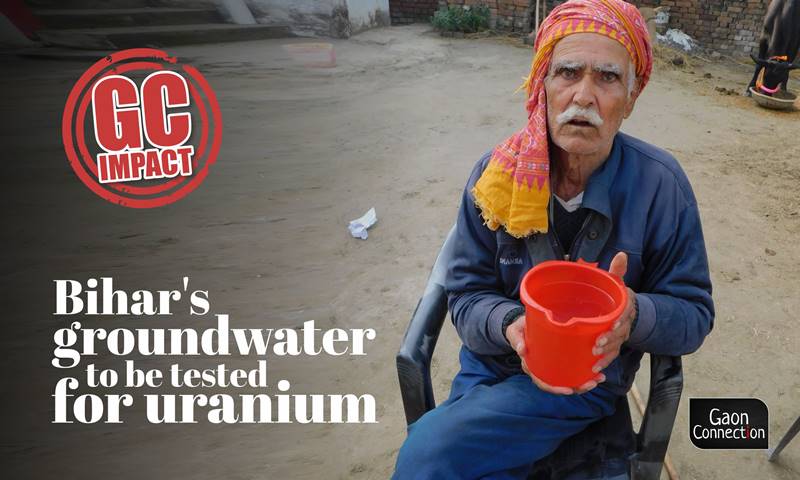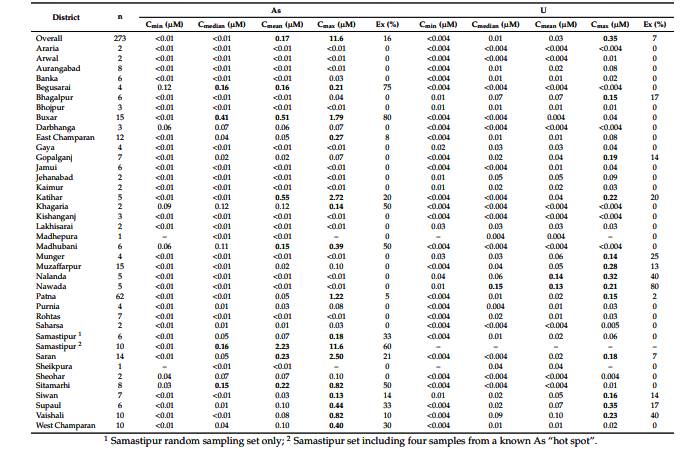Gaon Connection impact: After report on radioactive contamination, Bihar’s groundwater to be tested for uranium
Bihar’s Public Health Engineering Department and Central Ground Water Board will jointly conduct an investigation to assess the levels of radioactive uranium in the state's groundwater reserves. It is learnt that the process to procure the machines for testing water has already begun. Details here.


On December 3, Gaon Connection had reported that at least ten districts of Bihar have high levels of uranium in their groundwater.
Almost two weeks after Gaon Connection published a detailed ground report on the presence of high levels of uranium in Bihar’s ground, an official from the state’s Public Health and Engineering Department (PHED) informed that the state bureaucracy is preparing for an assessment of the water table in the state.
“The report has had an impact. The chief minister’s secretariat has directed the PHED to conduct testing of the groundwater in Bihar and assess the levels of uranium in it. The procedure will commence in the government laboratories in Patna and gradually, the investigation will also be carried out throughout the state,” Brahaspati Yadav, Muzaffarpur-based chemist at PHED told Gaon Connection.
“A tender has already been issued to procure the machines needed to carry out the assessment of the groundwater,” he added.

On December 3, Gaon Connection had reported that at least ten districts of Bihar have high levels of uranium in their groundwater, the primary source of drinking water in rural areas, which far exceeds the tolerable limit prescribed by the World Health Organization (WHO).
“Millions in Bihar are already facing a high disease burden due to elevated levels of arsenic, fluoride and iron in their water. Presence of uranium has multiplied their worries manifold. The state government is still yet to prepare a response plan,” the report had stated.
The report was based on a research study titled Distribution and Geochemical Controls of Arsenic and Uranium in Groundwater-Derived Drinking Water in Bihar, India and was published in the International Journal of Environmental Research and Public Health on April 6, 2020.
Supaul, Gopalganj, Siwan, Saran, Patna, Nalanda, Nawada, Aurangabad, Gaya and Jehanabad are the 10 districts in Bihar where high levels of uranium were found in the groundwater.
The team of researchers included Ashok Ghosh who is a professor at the Mahavir Cancer Institute and Research Centre, and is also the chairperson of Bihar Pollution Control Board (BPCB).
“Groundwater in Bihar’s Supaul district was found to have the maximum concentration of uranium at 80 micrograms per litre. This is almost three times higher than the tolerable limit fixed by the WHO at 30 micrograms per litre,” Ghosh had told Gaon Connection. “Siwan also has 50 micrograms of the radioactive element in a litre of water,” he informed.
“The research was conducted by collecting the samples from 273 locations across the state,” said Ghosh.
Arun Kumar, who is a senior scientist and a colleague of Ghosh, was also a member of the team which conducted the research last year. He had told Gaon Connection that the consumption of water contaminated with uranium has a serious effect on human health.
“Uranium is a radioactive element (emits radiation). It is a dangerous element which is used for the production of energy in the nuclear reactors. Once inside the human body, it begins to accumulate in the tissues of the digestive system. It not only damages the kidney and the liver but also leads to cancer which is not treatable,” Kumar had said.
With inputs from OP Singh in Patna

